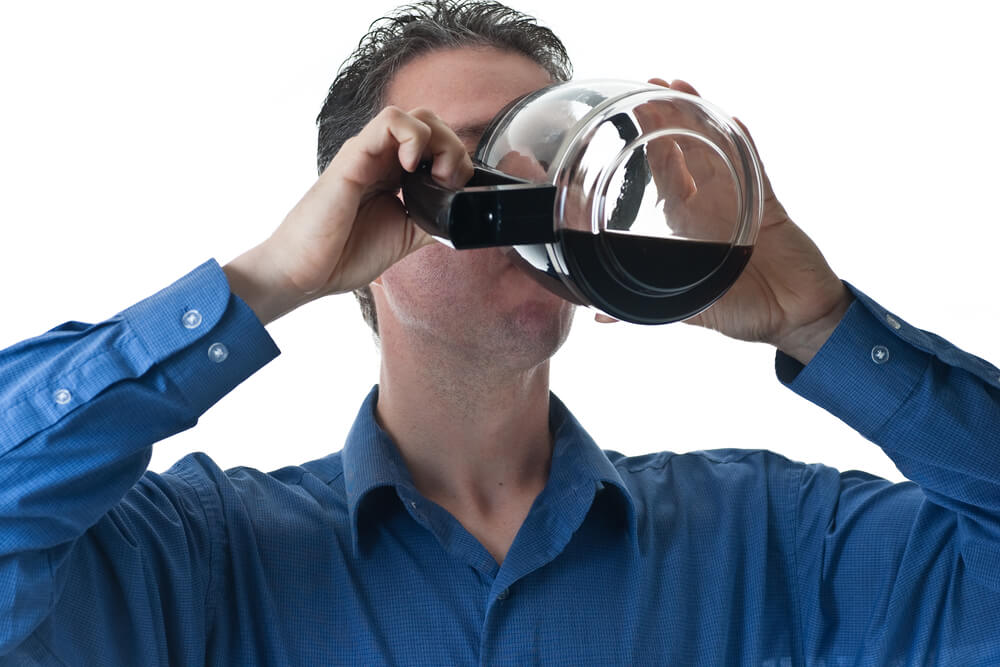What’s the recommended amount of coffee you should drink daily?
Coffee’s main ingredient, caffeine, is one of the most commonly consumed substance. It works as a stimulant, increasing alertness and decreasing fatigue. It’s the best way to get you moving in the morning and keeps you going throughout the day. But how much coffee is too much? At what point does overdoing it on coffee have negative effects on the body. Is caffeine bad for you? Here we’re going to address these questions as well as caffeine withdrawal symptoms.
Click here to see which drinks are good for diabetics.
Is Caffeine Bad for You?
The general consensus is that coffee has many great elements, whether with or without caffeine, to reduce the risk of serious disease and illness. On the other hand, when coffee is loaded with extras such as cream and sugar etc. that is when it becomes not so beneficial. Coffee in its purest state has many health benefits, if consumed at a normal rate because it helps boost energy and focus as well as the ability to protect the body from free radicals.
Negative effects of coffee when consumed too frequently are severe and when mixed with flavoring ingredients and sweeteners, the potential health issues grow. The main problems related to how much coffee is too much stem from the caffeine. In general, caffeine can cause insomnia, nervousness, restlessness, upset stomach, nausea, increased heart rate, vomiting as well as increased breathing.
How much coffee is too much? Think about the amount of coffee that is physically in each serving. Whether you are making it yourself or buying it from the store, there is normally more than a serving size of coffee placed in the cup. A serving size is around 8 ounces and in general, most consume more than that in a day.
When you get into numbers higher than 3 – 4, that can be considered a cause for concern, especially if it is mixed with things other than coffee. The more you consume the higher the risk of diseases such as cardiovascular disease. If you are unsure whether you are consuming too much coffee or not, speaking to a medical professional about your concerns is the best option to ensure that you are doing what is best for your body and your overall health.
Caffeine Withdrawal Symptoms
Caffeine withdrawal symptoms can commonly begin 12-24 hours after quitting caffeine. Since caffeine affects the CNS (central nervous system) when the system no longer has it, the stronger the body feels the lack of it. There are a few common caffeine withdrawal symptoms and they can be noted as the following:
- Feeling Down / Depressed: Caffeine makes individuals feel better by increasing alertness and thus cutting out caffeine can make users feel down in the dumps.
- Anxiety: Caffeine increases the heart rate and blood pressure and the body can even become dependent on it both physically and mentally. When dependency occurs and the body is lacking caffeine, anxiety will occur.
- Fatigue: When people are lacking their daily dose of energy it’s normal that they feel fatigued when it is no longer consumed. The same feeling can happen when the caffeine wears off leaving the individual feeling tired and drowsy.
- Headache: feeling a headache is one of the most common symptoms of caffeine withdrawal. The reason is that caffeine causes increased blood flow to the brain which can create headache symptoms in some people.
- Irritability: As anxiety, when caffeine is cut out, users may feel angry upset when not consuming caffeine.
- Problems Concentrating: Caffeine in general increases concentration so when it is not consumed brain fog may be felt of lack of concentration.
Click here to discover health benefits of dark chocolate.
At the end of the day, coffee with caffeine consumed in moderation and not loaded with extras can have many health benefits. If coffee with caffeine is overused and abused, that is when health problems can pop up causing disease and other health complications.
